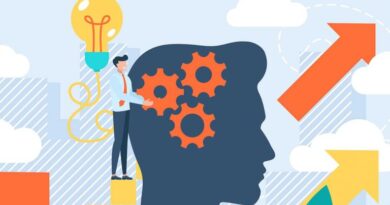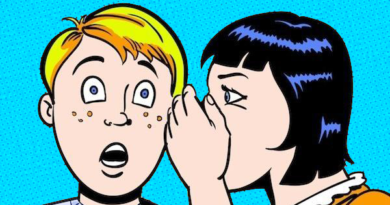Be Aware of Autism Awareness Month
- Not all autistic individuals are touch adverse
Many are completely fine with or even enjoy physical touch so long as it is expected and respectful.
- The term “allistic” refers to those who are not on the autism spectrum
- Autistic people often have an extremely difficult time hiding their expressions or how they’re feeling
Autistic people often get reprimanded by authority figures, or peers, for perceived disrespect (frowning, furrowed brow, lack of eye contact) or mistimed expressions (laughing or smiling at inappropriate times). These behaviors are typically uncontrollable or unconscious, and no offense is intended (unless stated otherwise).
- Autism cannot be acquired after birth
- Autism genes are typically inherited paternally
- Changing set plans with an autistic person is often greatly distressing
Even something as seemingly minute as a last-minute or unmentioned change in the number of people at a function may throw an autistic person off and trigger an anxiety attack.
- Not all autistic people feel uncomfortable making eye contact
Many autistic people feel no discomfort when making eye contact, however, it is a very manual process for them so they may tend to make intense eye contact, or often too little eye contact on accident.
- Autistic people can have a sense of humor contrary to popular belief
Many people believe that autistic people can’t understand humor or sarcasm, however many do and will utilize sarcasm regularly.
- The term “Aspergers” is not used anymore, and is widely considered ableist by individuals in the community.
When necessary to distinguish between the varying levels of support needed by autistic individuals, “high support needs” or “low support needs” is preferred, but many are more comfortable with no distinguishment at all.
The reason the term “Aspergers” is widely offensive is due to its coining by nazi scientist Hans Asperger, who used the term to distinguish between “functional autistics” who would be allowed to remain in society, as opposed to those with higher needs that would, unfortunately, be killed or imprisoned. The general term “ASD” is typically the most appropriate.
- Not all autistic people find difficulty in experiencing, identifying, and expressing emotions, unlike how many autistic people are portrayed to have in media.
This phenomenon is called alexithemia, and is experienced by allistic people as well as autistic people, although at a lower rate.
- Most people in the Autistic community prefer identity-first language as opposed to person-first language
Essentially, the term “autistic people” or “autistic person” is typically preferred, opposed to calling them “people with autism”.
- About 1 in 10 of people with autism spectrum disorder also have another genetic, neurological, or metabolic disorder
These are called comormid conditions, and can make certain aspects of life much harder for autistic people. These frequently include sleep disorders, gastrointestinal issues, auditory processing issues, premenstral dysphoric disorder, etc.
- The rate of people with autism in the United States increased from 1 in 150 children in 2000 to 1 in 54 in 2016, and the rate now stands at 1 in 44 children.
Some people may believe that this increase is due to some external factors causing autism to occur more frequently in the population, however, scientists and psychologists state that the vast majority of this increase is accounted for by expanding research on autism and the variety of ways in can present that weren’t previously accounted for.
- Autistic people are significantly more likely to identify as part of the LGBTQ+
Autistic females are about 3 times as likely to identify as bisexual, and autistic males are 3.5 times more likely when compared to their non-autistic counterparts. In a study measuring rates of heterosexuality in autistic people, 69.7% of the sample reported being non-heterosexual.
People who do not identify with the sex they were assigned at birth are three to six times more likely to be autistic than cisgender people are, according to the largest study yet to examine the connection.
It’s speculated that this is because the autistic brain is typically considerably less receptive to societal norms and expectations. Therefore, they’re less likely to conform to the external pressures that may influence them to suppress a sexuality or gender that deviates from the norm. For example, a study indicated that autistic people were significantly more likely to identify as bisexual after one same-sex experience unlike many of their allistic counterparts
- As many as 80% of autistic individuals have associated executive functioning challenges.
Executive dysfunction is defined as “a behavioral symptom that disrupts a person’s ability to manage their own thoughts, emotions and actions.” This can look like being unable to do tasks the individual actively wants to acomplish (not to be mistaken for procrastination or laziness), trouble managing emotions or impulses, maladaptive daydreaming, socially inappropriate behavior, trouble listening or paying attention, short term memory issues, trouble following through with plans, managing time, multitasking, etc. This is also extremely common among those with ADHD.
- Boys are nearly 5 times more likely than girls to be diagnosed with ASD. Girls are often underdiagnosed with autism and misdiagnosed with other conditions.
Psychologists suggest that this may be due to a combination of factors, such as a higher prevalence of “masking behaviors” (which camoflage autistic traits) in autistic girls likely due to sociological pressure to generally emphazise values like fitting in, communication skills, and emotional intelligence. Additionally, the criteria for identifying autism in previous decades was almost entirely based on research done on young boys, which very much excluded many girls with autism who often have different presentation. Instead, many women, especially women of color, were, or still get diagnosed with a miriad of other issues such as BPD, BDD, anxiety, depression, NPD, etc.
- When feeling overwhelmed with emotion, it is common for some autistic individuals to become “non-speaking” (not non-verbal)
Non-speaking refers to the extreme difficulty, or sometimes psychological inability to speak. For some autistic individuals, this is a much more long term state, sometimes lasting weeks, months, or even years. For some this state is temporary, only really lasting the duration that they’re overwhelmed. Becoming non-speaking doesn’t mean it’s completely impossible for the autistic person to make noises (this would be what’s referred to as non-verbal), communicate, or even speak, however it does become extremely difficult and taxing. If an autistic individual you know is shutting down and becoming non-speaking, try to limit your communication to statements, or yes or no questions. An estimated 25-30 percent of people with autism are nonverbal or minimally verbal.
- There is a misconception that most low support need autistic individuals are geniuses that will excell in one subject or another, like math, science, general trivia, etc. However, this is not accurate.
Only about one in 10 persons with ASD have some savant skills. So while the majority of autistic people have no savant skills, about 75 to 95 percent do have have “special interests.” Special interests are essentially defined as “when one focuses intensely on a narrow topic.” This can present as collecting items which relate to the interest, spending hours researching information on the topic, reciting learned facts on the topic to anyone willing to listen, creating lists or documents compiling information or imagery, etc. If you know an autistic person, inquiring about their special interests is often an effective way to bond and show you care for them.
- Everyone is not “a little autistic”
You are either autistic, or not. Autism is the result of dysfunction in mirror neuron system. There is either dysfunction, or not.
- You are not an ally if you enjoy making fun of typically autistic characteristics in people, reguardless of if they’ve been diagnosed with autism or not.
All too often people are caught mocking or making fun of those who are marked as socially inept, don’t fit societal norms, have “odd” or “obsessive” interests, strange mannerisms, etc, and yet many of these same people would claim they have nothing against autistic people, or that they even support them. While having some of these traits doesn’t gurantee that someone has autism, many, many autistic people do and it’s because of their autism. “It’s not that I don’t like autistic people, I just don’t like this person because they act autistic is all!” is how many people sound when confronted about their ableist views. If this is you, please, try to do better and examine why you think it’s okay to mock people with these qualities, or anyone at all for that matter.
- Masking is extremely exhausting, and sometimes debilitating for autistic people
Masking is officially defined as “when one learns, practices, and performs certain behaviours and suppresses others in order to be more like the people around them”. Some allistic people may claim that this behavior is normal and a fact of life, however this is not accurate. While it’s true that most people hide their true selves to some degree when in public, typically to socially mesh with other people in a more cohesive manner, this is not considered masking. While social graces, norms, and socially acceptable behaviors are integrated and learned relatively seamlessly by allistics, for autistic people this process is particularly difficult, confusing, and exhausting due to the mirror neuron dysfunction in their brains. While most social behaviors for allistics is automatic, for autistic people this process is manual. For example, most allistic people are able to make an appropiate about of eyecontact automatically, without much conscious thought, but autistic people must consiously think about the duration of time they’ve been making eye contact, the duration of time to break eye, and how quickly to establish eye contact again, etc.
Masking can be so debilitating for autistic people, that living in high masking environments for long periods of time can suddenly trigger long bouts of catatonia or severe sensitivity. In some cases, this has looked like not being able to leave bed for multiple years, autistic parents being unable to interact with their own children or spouse, not being able to speak, not being able to move, having constant meltdowns, severe noise sensitivity, extreme fasting due to food aversion, etc. These periods are also known as autistic burnout and can last between days and years.
- Tantrums are not the same as autistic meltdowns, and you should avoid using tantrum and meltdown interchangably.
While often confused for one another, these two behaviors are vastly different. Tantrums are voluntary, done to achieve a goal or elicit a reaction, typically they occur in response to not getting something they want. Tantrums are soothed once the goal is achieved, or until they realize the tantrum is not eliciting the desired reaction from the observing parties. Meltdowns however, happen regardless of if someone is watching. Meltdowns are completely involuntary, and are a response to being overwhelmed. While meltdowns can happen as a result of not achieving something wanted, there is no goal or purpose to the meltdown. Meltdowns are also considerably more unpleasant and emotional than tantrums, often resulting in self harming/destructive behaviors in an attempt to self soothe. This can include aggressive picking, scratching, biting, or pulling at skin, hitting or punching oneself, kicking, banging your head into something, throwing objects, hair pulling, etc. It can also involve crying, yelling, screaming, rocking back and forth, racing heartbeat, difficulty breathing, etc. Meltdowns happen to both autistic children, and adults, and do not speak to the maturity level of the individual it is happening to.
- Many autistic individuals do not seek formal diagnoses, and opt to self diagnose instead due to discrimination and ableism
Countries including but not limited to Australia, Finland, New Zealand, Sweden, and UK all either completely ban autistic immigrants (with no exception for even those with work visas), or often use autism as reason for denial of immigration. An autism diagnosis can be used against autistic individuals legally in matters such as custody disputes (courts overwhelmingly favor non-disabled parents), reproductive healthcare/rights, denial for organ transplants, medical autonomy, ability to adopt, automatic disqualification from military service, eligibility for hormone therapy, and may even be used by abusive guardians to forcefully place fully capable autistic individuals in conservatorships or mental health institutions. Additionally, autism diagnoses can cost on average between $500 – $1500, which is out of many people’s budget, which is especially devastating when you consider that autistic people earn a median of 33.5% less than non-disabled employees.
- The puzzle piece is not the symbol for autism, or even autism support. Please do not use that symbol. The puzzle piece often represents ideas of eugenics or “brokeness” for autistic people. Instead, the rainbow infinity symbol is regarded as the official symbol to represent those with ASD.
To give you an idea of how Autism Speaks views autistic people, in 2009, Autism Speaks released an ad titled “I Am Autism” that portrayed autism as a silent and sinister killer. The ad claimed that autism ‘works faster than pediatric AIDS, cancer and diabetes combined’ and ensures that marriages will fail, financial ruin will ensue and that it will ‘rob [parents] of [their] children and dreams.’ Despite this, a number of individuals, including autistic individuals, claim that Autism Speaks has changed their views, and rectified their actions.




